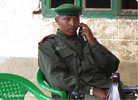
Human Rights Watch recently posted a letter on their website signed by more than fifty Congolese non-governmental organizations operating in eastern Congo. The letter was addressed to Congo’s president, Joseph Kabila, and was an impassioned and forceful call to the Congolese government to take a stand for peace and justice:
Since there can be no sustainable peace and security without justice, we urge you to respect your international commitments and to deliver the war criminal Bosco Ntaganda to The Hague, where he is sought by the International Criminal Court (ICC) for war crimes in the Ituri District of eastern DRC between 2002 and 2003…
It is an insult to justice that a wanted man is involved in military operations in eastern DRC. It is also an insult to the victims if yesterday’s torturers are today their protectors….
This is a golden opportunity, Your Excellency, to prove that you will translate words into action. You can prove that our people can count on you, and can continue to trust in you, to bring peace to eastern DRC and to restore justice.
This letter illustrates the Congolese people’s firm belief that peace and justice cannot and must not be separated. Unfortunately, last week, Congolese justice minister Emmanuel-Janvier Luzolo, contradicted this principle, arguing that:
in the judicial practice of any state, there are moments when the demands of peace override the traditional needs of justice.
As their letter powerfully asserts, Congolese people clearly see that if a “demand of peace” is allowing indicted war criminals such as Ntaganda to serve as “protectors” of Congolese people, then this peace will never be just.

